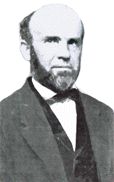 Welcome to the book by Rev. John G. Fee, Non-Fellowship With Slaveholders The Duty of Christians (1849). To go to the "Table of Contents" immediately, click here.
Welcome to the book by Rev. John G. Fee, Non-Fellowship With Slaveholders The Duty of Christians (1849). To go to the "Table of Contents" immediately, click here.
Prior to the 1861-1865 War, there were a number of Christian abolitionists who opposed slavery. Nowadays, their Biblical-based reasons are generally unknown. This series of websites educates by making the text of their writings accessible. Whether or not you agree with their position, it is at least a good idea to know what it was! This site in the series reprints the named book by Rev. John G. Fee (1816-1901), a Kentucky clergyman, who wrote several anti-slavery books, and founded Berea College. It in essence elaborates and elucidates the position taken years earlier by Rev. Fee is a writer skilled at writing in clear language, and the editor hopes the information here is of value to you. The book applies certain Bible principles. |
Non-Fellowship
With
Slaveholders
The
Duty of Christians,
by
Rev. John G. Fee
(New York: John A. Gray, 1849, 1855 ed.)
| Preface | 1
| Non-Fellowship With Slaveholders The Duty of Christians | 3
| 4
| I. God Commands Christians So to Do | 4
| II. Fidelity to Souls Around Us Requires That We
| 11
| III. Fidelity to God's Word Requires That Christians
| 13
| IV. Again, The Prosperity and Well-Being of
| 15
| V. The Purity of Public Morals Demands
| 16
| VI. Consistency Requires That We
| 18
| VII. Your Usefulness Demands It | 21
| VIII. Again, We Should Have No Fellowship
| 22
| IX. Again, We Should Have No Fellowship with Slavery, | 27
| 29
| 1. Surely Not For Every Error Should I
| 29
| 2. If We Discipline the Slaveholder, We Shall
| 30
| 3. So the Slaveholder Is a True Believer, So He Gives | 31
| 4. We Must Take the Slaveholder In, and Allow Him | 33
| 5. I Believe Slavery is Sinful, and That the Church Ought
| 37
| 6. There Are Many Other Portions of Scripture Supposed
| 53
| 7. Christ Communed, Continued Fellowship with
| 54
| 8. Everyone Is to Judge of His Own Fitness | 55
| 9. If We Must Avoid Sinners, We Must Leave
| 56
| 10. The Scriptures Teach Us to Mark Them
| 56
| 11. We Must Be Subject to The Powers That Be | 58
| 12. Slavery Is A Political Matter, and As Such, | 59
| 13. These Divisions and Discussions Cause So | 61
| 14. I Must Not Give Up All Else in my Church For | 62
| 15. Say What You Will, I Am Not
| 64
| 16. I Desire A Non-slaveholding Church, But There | 65
| 17. I Am Daily Praying for A Pure Church,
| 66
| |
